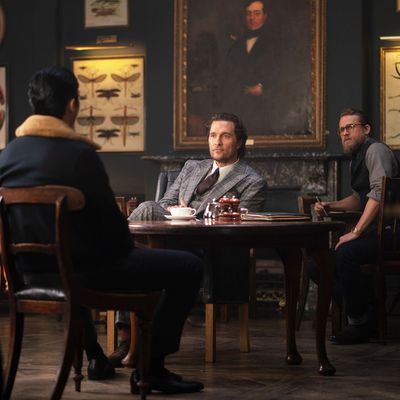
You could trace an arc of Guy Ritchie’s life through the gangster movies he has spent half his career making — six in total, if you count his 2017 attempt to turn Arthurian legend into a Cockney caper, which you absolutely should. When he made his leap from commercials to the cineplex in 1998, it was with Lock, Stock, and Two Smoking Barrels, a crime comedy that happened to be about a bunch of small-timers making their own foray into bigger business. In the middle of his eight-year marriage to Madonna, he put out the incomprehensibly pseudo-philosophical Revolver, which sure seemed to be influenced by Kabbalah, whatever his protests to the contrary. And now, after riding high in Hollywood with a decade that tilted slightly more toward studio hits than misfires, he has directed The Gentlemen, a movie that’s clearly meant to be seen as a return to laddish form but that instead feels sour and begrudging — the work of someone who’s got nothing left to contribute to the game but can’t bring himself to leave it behind.
That is, not coincidentally, the position its main character finds himself in. Mickey Pearson (Matthew McConaughey) is an American gangster in London, one who became a pot kingpin by paying off impoverished gentry in order to hide his grow operations on their land. Now he’s looking to get out of the business and enjoy, as he puts it, the middle-class benefits of gentrification and private school with his tough-talking wife, Rosalind (Michelle Dockery). He has been courting a buyer, another American, named Matthew (Jeremy Strong, whose Toby Turtle–esque styling is only the second most ridiculous in the movie) — though, given the act of violence with which The Gentlemen begins, it’s clear things haven’t gone smoothly. The movie then uses a blackmail proposition made by a slithery private eye named Fletcher (Hugh Grant) to Mickey’s second-in-command, Ray (Charlie Hunnam), to unfold its typically convoluted story in flashbacks. The long and short of it (sorry) is that it’s all a dick-measuring contest — a “good old-fashioned cock-off” — that also encompasses an MMA gym belonging to a guy who goes by “Coach” (Colin Farrell, winner of the movie’s most-hilariously-dressed contest), a tabloid edited by Big Dave (Eddie Marsan), and the Chinese mob, in particular an up-and-comer named Dry Eye (Henry Golding).
The Gentlemen lobs antiquated Asian jokes at Dry Eye and his compatriots with the dedication of a canceled stand-up comic on a Yondr-guarded comeback tour. Dry Eye is introduced as a “Chinese James Bond,” the follow-up being that he has a “ricense to kill.” The movie’s preferred term for his cohort is Chinamen, as in “Chinamen upgrade faster than phones.” At one point in the movie, Coach lectures one of his students about a slur being fine “only if it comes from a place of love.” If that’s meant to be the movie’s statement of self-justification, it’s both terrible and inapplicable. The Gentlemen exhibits not a trace of affection for its Asian characters. They’re sneered at by Mickey for dealing hard drugs — “a destroyer of worlds,” he says, as the movie cuts to the overdose of the addict daughter of one of his aristocratic allies. Dry Eye’s arc is painted as one of repeated, frustrated emasculation, culminating in an out-of-the-blue attempted rape that seems to have been casually written into the film to let Mickey come to the rescue. Contempt is the whole point of bits like the one involving a minor character whose name is Phuc. It’s not meant to be funny in itself; any laughs the movie hopes to get come from its own perceived daring in including racism so overtly.
This is what passes for provocation from Ritchie now, apparently. He sure doesn’t prove himself capable of other surprises throughout the movie, which holds with great seriousness to an extended animal-kingdom metaphor. Mickey is the king of the jungle, a silverback, a lion who’s getting ready to settle down and raise some cubs. For a filmmaker who used to make these movies with a measure of anarchic glee, Ritchie appears to have bought into his own bullshit here. Occasional pleasures aside — mostly coming by way of Grant’s performance as a man both lavishly greasy and engaged in an apparent game of gay chicken with the fastidious Ray — The Gentlemen turns out to be startlingly uncomplicated once its twists are untangled. It’s about a guy who starts out on top and showily asserts his dominance over everyone in order to affirm that he’s going to stay on top even if he opts to leaves the business. It’s the display of someone desperate to demonstrate that they haven’t lost their edge — despite, say, making a live-action Aladdin — and proving instead how out of touch they actually are.


